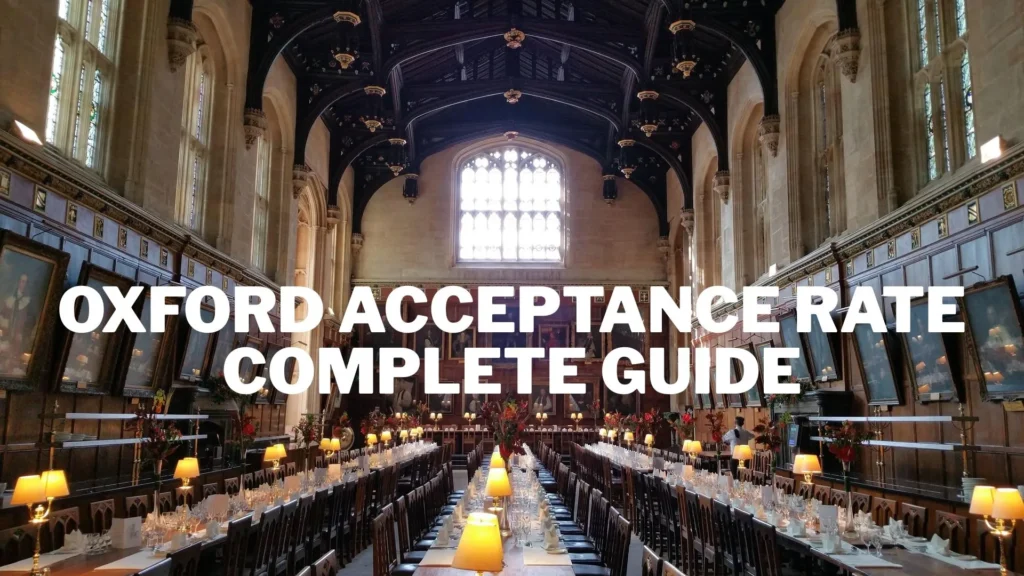Oxford University Acceptance Rate For International Students
The University of Oxford is a source of academic inspiration and aspiration and a goal for students worldwide. For international candidates the path to an Oxford University offer may appear enigmatic especially the Oxford University Acceptance Rate for International Students. This complete guide debunks the myths offering up-to-date figures an in-depth examination of the application and practical lessons.
for more information about oxford University Courses get here.
The Oxford Acceptance Rate: A Clear Picture
The first step in any successful application is understanding the landscape. While Oxford University is highly selective, the acceptance rate for international students is often more encouraging than many realize, and importantly the competition is fair.
Undergraduate Acceptance Rate for International Students
Oxford University approach to admissions is unique: there is no international quota for the vast majority of courses. All applicants compete on merit, using the same rigorous standards.
click to get info about undergraduate Courses of Oxford University.
| Domicile | Applicants (2022) | Acceptances (2022) | Acceptance Rate |
|---|---|---|---|
| UK | 18,338 | 2,593 | 14.1% |
| EU | 884 | 134 | 15.2% |
| Non-EU International | 3,839 | 544 | 14.2% |
| Overall | 23,061 | 3,271 | 14.2% |
Source: Oxford University Admissions Statistics 2022.
As the data shows the acceptance rate for non-EU international students is virtually identical to the overall and UK acceptance rates. This is a crucial point: your application is judged solely on your academic potential, not your nationality.
The Medicine Exception: The only significant exception is the Medicine course which is subject to a national cap limiting international student intake to 7.5% of the total places.
Graduate Acceptance Rate for International Students
For graduate programs the international presence is even more pronounced. In the 2023-24 academic year, a massive 74.3% of all graduate applications came from outside the UK.
click to get info about graduate Courses of Oxford University.
| Domicile | Applications (2023–24) | % of Total |
|---|---|---|
| UK | 9,707 | 25.7% |
| EU | 3,572 | 9.5% |
| Non-EU International | 24,434 | 64.8% |
| Total Graduate Applications | 37,713 | 100% |
Admissions Statistics 2023-24. The overall acceptance rate is around 17.8% – 6,702 acceptances from 37,713 applications but this varies drastically by department and course. The important point for international graduate applicants is the size of the pool of competition, driving the necessity for an exceptionally competitive application.
The Path to Oxford: A Step-by-Step Guide
The application process is the same for all students, but international applicants must pay close attention to specific requirements.
Choosing Your Course and College
- Ensure Course Selection: Make sure you are sure of which course you wish to study. At Oxford, courses are highly specialized and changing majors is very difficult after you get in.
- Verify International Qualifications: You should verify that your international qualifications are acceptable and that you are on course to achieve the necessary grades. Oxford University website has an extensive list of accepted qualifications. If your qualification is not listed, find out if you can pursue an accepted equivalent.
- Express College Preference: You can either have a preference for a specific college or make an open application. Open applications are not encouraged even though they may seem easier to go through. Making a college choice based on your personality and academic interests will rate your application more competitively.
The UCAS Application and Deadlines
UCAS and UCAS deadlines: All undergraduate applications are transacted by the UCAS system. The typical deadline is 6:00 pm UK time on October 15th. This is much sooner than most other university deadlines, making early preparation critical. For the initial submission of your application, there is no requirement to submit transcripts or certificates. Rather you should enter all of the details into your UCAS form as they are referred to above under “What is required in the application?”
The Role of Predicted Grades
For international students, particularly those whose education system does not typically use predicted grades, this is a vital component.
- Requirement: For every exam you are yet to take, a predicted grade is required.
- Referee Advice: Your academic referee (teacher) must provide these predicted grades. It is crucial to direct them to Oxford’s guidance pages to ensure the predictions are submitted correctly and credibly.
Maximizing Your Application
The acceptance rate is a statistical measure your focus should be on the quality of your individual application. Oxford tutors are looking for academic excellence and potential above all else.
Academic Performance and Subject Requirements
However meeting the minimum grade requirements is necessary but rarely sufficient as the vast majority of successful applicants exceed those. Furthermore pay close attention to any specific subject requirements for your respective course. For example Oxford University usually requires particular levels of some sciences or languages. Lastly note that Oxford does not accept transfer students under no conditions. Therefore if you are currently attending any other university you must apply to start the course from scratch and provide serious reasons why you want to drop your current studies.
Admissions Tests and Written Work
Most courses require an admissions test (e.g., HAT, MAT, TSA, BMAT). These tests are designed to assess your aptitude for the specific course and your ability to think critically, not just your knowledge base.
- Preparation: Treat the admissions test as seriously as your final exams. High performance is a key differentiator in the selection process.
- Written Work: Some courses require you to submit written work, which allows tutors to assess your analytical and writing skills before the interview stage.
The Interview and Personal Statement
The interview is the last step—undoubtedly the most important step—of the process. Think of it as an academic conversation meant to probe your interests and ability to process and analyze a set of ideas.
- The Personal Statement: Your UCAS personal statement illustrates your interest in the field and your self-directed study outside the curriculum. For candidates with vocational or technical qualifications, the personal statement should clarify how your experience has equipped you for Oxford’s academic demands.
- Interview Preparation: Expect to defend your personal statement, written work, and predicted grades. This will be a conversation about the ideas, not a memory test.
Financial Planning: Scholarships and Support
For international students, the expenses associated with studying at Oxford University are considerable.
- International Bursaries: Although a majority of bursaries are targeted at UK students, Oxford and its colleges provide several scholarships that are exclusively available to international applicants [3].
- Key Scholarship: For applicants from countries on the official development assistance DAC list, the Reach Oxford Scholarship is a particularly noteworthy opportunity [3]. Since only a limited number are awarded each year and not all colleges are involved, there is a need to do some research.
Conclusion
The Oxford University Acceptance rate for International Students rate is a testimonial to the institution’s dedication to global talent. The steps you take to attain the same are extremely tricky but that cannot stop you from even achieving the dream of a lifetime. All you need to do is put your application together with great care, acquire strong predicted grades, and surpass all other requirements before finally applying the dream at the UK’s leading University.
Oxford University’s acceptance rate reflects its academic excellence, with admission highly competitive across both domestic and international applicants.
The Advanced Computer Science MSc at Oxford University equips graduates with cutting-edge research skills, innovation expertise, and industry-ready computational knowledge.


